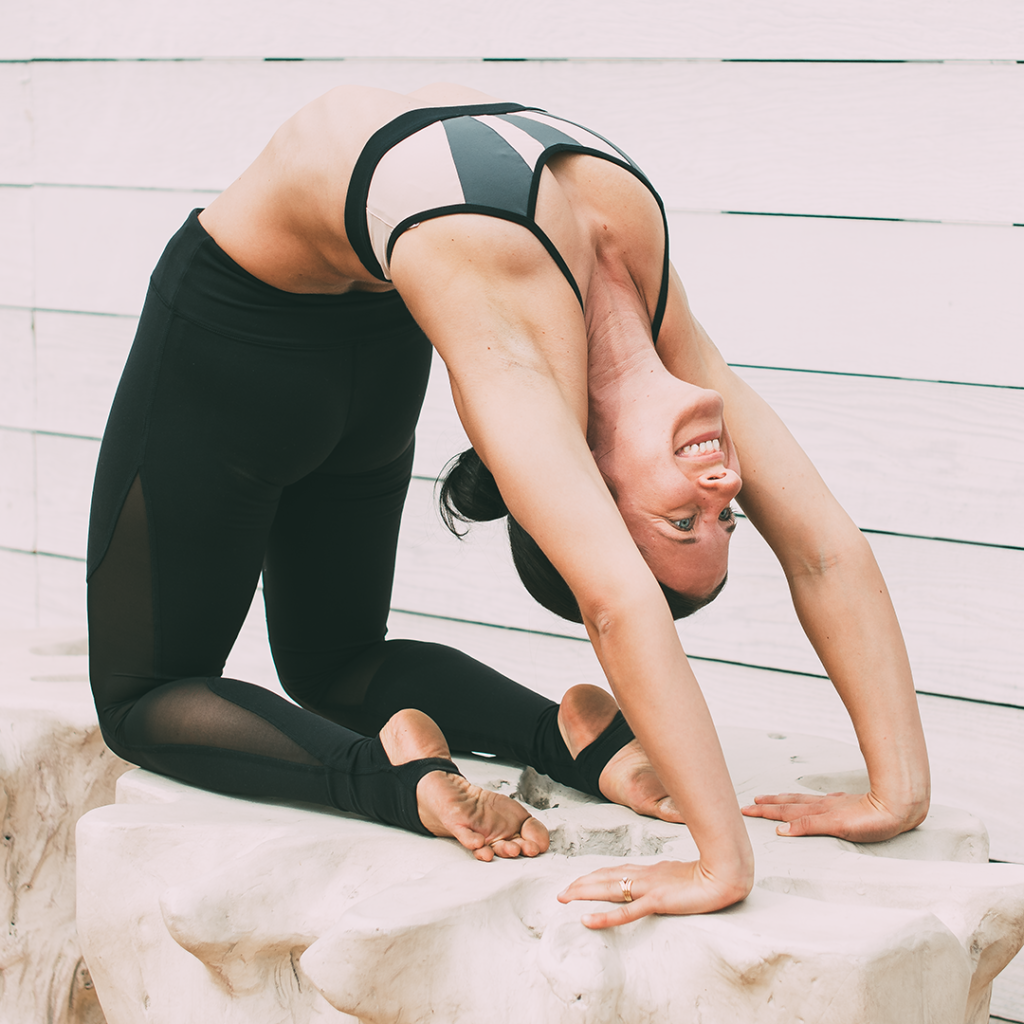
Listen
Listen on iTunes / Listen on Spotify
MacKenzie Miller Kozlowski is a world renowned yoga teacher and also mom to one and a half year old Adler.
Here, MacKenzie shares about how she’s transformed since becoming a mother, how meditation has helped her process her grief after miscarriage, and why she’s so inspired to support mothers with the platform she originally created to share great pictures of fancy backbends.
Episode Highlights
- 2:51 – MacKenzie talks openly about her recent miscarriage, how she's doing, and what it's been like since
- 7:02 – How meditation and mindfulness have helped MacKenzie process her grief
- 10:53 – Why MacKenzie despises the phrase “get your body back” and how she thinks about postpartum body image
- 12:33 – How pregnancy gave MacKenzie a newfound respect for her stomach
- 21:36 – How miscarriage and a complicated birth history has made it difficult to plan for her professional future
- 24:34 – Why MacKenzie believes cesarean birth is natural birth
- 33:13 – MacKenzie discusses why she likes science and also why she likes more holistic approaches too
- 38:59 – On making decisions based on what feels right in your heart
- 42:11 – Sleep training, and why MacKenzie swears by it (even though she never thought she would)
Linkable Mentions (In Order Mentioned)
- 1 Giant Mind – MacKenzie's mindfulness and meditation tool.
- East African Belly Birth – This is the post I saw about the topic, and this is the source from 1879.
- Not Broken – A book on miscarriage and recurring pregnancy loss that beautifully marries eastern and western medicinal practices.
- Taking Cara Babies – MacKenzie's favorite baby sleep resource, and the methodology she and Mike used to help Adler learn to sleep through the night.
- Ergobaby Carrier – MacKenzie's go-to for outdoor adventures big and small.
- @mackenzieyoga – Where you can follow MacKenzie and her adventures.
- AloMoves – You can find some wonderful yoga classes taught by MacKenzie on AloMoves ($20/mo after a free 14 day trial) or you can also find some free classes on the AloMoves YouTube channel.
Transcript
MEGAN: For those who are not familiar with you or your work, who are you what are some of the many hats you wear?
MACKENZIE: A lot of people just know me as MacKenzie Miller, but my married name is Kozlowski. I’m a yoga teacher by trade, and I feel like more and more that’s taking the backseat and motherhood is my career—and sharing that.
So I’m pretty fortunate to have just found a little piece of the world that is interested enough in me to invest in me both as a yoga teacher and as a mother. So that’s where I spend my time and energy investing it.
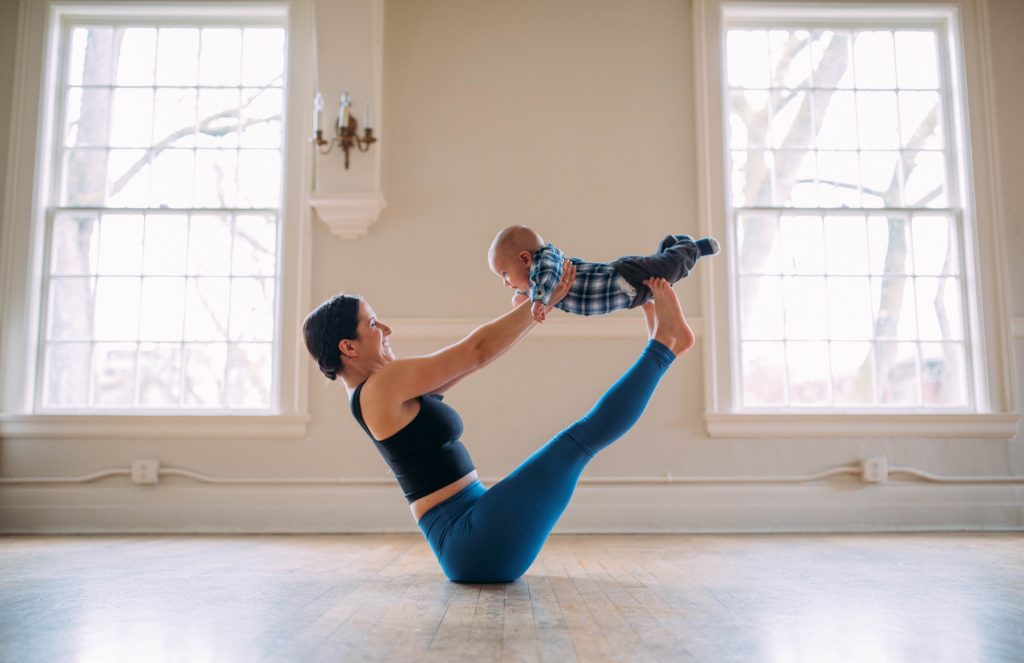
MEGAN: That’s so fortunate and so beautiful. So obviously yoga has played a huge role in who you are and who you’ve been and I definitely want to talk more about that. But I also just want to make some space here in the beginning of the conversation, if you’re comfortable with it, to talk about the big and heart wrenching elephant in the room—at least for me and those who follow you on Instagram. So, you announced your second pregnancy kind of right around Christmas time with this adorable photo of your toned little bump [laughter], and then you recently learned at your 19-week ultrasound that your baby had passed away. Which—just—ugh. I wish I could give you a big hug over the phone right now. But how are you doing with that and with that news?
MACKENZIE: Honestly it’s a bit surreal. It’s a week ago almost—like—to the minute that we would’ve found out that our baby’s heart had stopped beating a month prior to our ultrasound. And so, yeah—that was a week ago, and it’s been a bit of a whirlwind. We essentially had to—well we didn’t have to—but we made the decision to get the processes started. In general if you miscarry, your body sometimes doesn’t know until about four to six weeks later, so I was about at the five week mark, and the longer—and I mean this is kind of graphic so anyone who is easily—they’re queasy—you might just want to skip ahead a few minutes—but the longer you have a decaying body—little human—in you, the higher risk of things going wrong for me as the mother.
So we made the decision that we would go straight to the hospital and get checked in and I would have to then—kind of go into labor. They induced me and it was a long process. You’d think that at—well—our little baby—which I haven’t announced on Instagram yet—was a little girl—and she was about 14, 15 weeks. So she was born at 11 centimeters and, like, nothing. She weighed so little. You’d think that birthing something so small wouldn’t be painful or wouldn’t take a long time, but it took about 12 hours and a lot of induction medicine. My body definitely wanted to hold onto this little angel for as long as possible and love and nurture it in any way that it could.
So it—yeah—it was—in a way it doesn’t even feel like it was me and it’s surreal that it’s been a week. And you almost wouldn’t have even been able to tell that I was pregnant to begin with—that in a way it feels like a bit of a dream. [Laughs.]
And physically I’ve really—I’ve healed, really nicely, so I’m really fortunate in that way. And so now it’s more just kind of healing my heart. And you know that’s a bit of a longer process. I think right now I actually have found quite a bit of peace around the situation. If and when we decide to start trying again and I get pregnant, I’m sure I’ll be a complete basket case. So [laughs] I feel like right now it’s good. Ask me in an hour, ask me in a week, ask me in a month, and you might get a completely different answer.
MEGAN: Yeah but that’s how these things go, and that’s part of the process.
Grieving is not linear.
MACKENZIE: Yeah that’s certainly—grieving is not linear.
MEGAN: No it’s not. Has your training in yoga been helpful at all and the way that you’ve had to train your mind? Obviously your body is so strong, but I mostly mean the way that you’ve been so thoughtful throughout this process. And I wonder how much of that can be ascribed to your practice.
MACKENZIE: I think a lot of it can be. I mean, I’ve been practicing, like, the physical practice of yoga for 13 years now, and I think that any—most people who practice for a decade go through quite a transformation and these ebbs and flows of what matters most or what’s important to you in your practice. And I think that working—you know I used to be quite about physically performing things. Being able to achieve “advanced postures.”
When I got pregnant with Adler, I completely backed away from backbends. And I’d say that that’s somewhat what I was known for—I was quite able to do very deep backbends. And so to stop that completely—it’s a mental practice to kind of let go.

Photo: Hanna Witte
MEGAN: Beating yoga basically? [Laughs.]
MACKENZIE: Yeah I was winning. I was winning at yoga hard. [Laughs.] And that’s not my priority now. It’s not saying that what I’m focused on is better now, but it’s just different. And I think though the dedication it takes to achieve what I did physically teaches you a lot of dedication and persistence and showing up for yourself.
So more recently, I’ve backed away from advanced postures in yoga. Specifically when I got pregnant with Adler, I completely backed away from backbends. And I’d say that that’s somewhat what I was known for—I was quite able to do very deep backbends. And so to stop that completely—it’s a mental practice to kind of let go.
I think motherhood in general is very similar to yoga. If you’ve ever injured yourself in the yoga practice, you kind of have to redefine what matters to you, how you define yourself within the practice. And motherhood is very similar. When you become a mom your whole definition of self begins to shift.
And so when I became pregnant with Adler I decided to shift even more towards therapeutic aspects of yoga, specifically meditation. And so I did a meditation training with 1 Giant Mind and I just got really into—I’ve always been really into—myofascial release, so I continued doing that, and meditation, and restorative practices were my saving grace throughout my pregnancy and postpartum for sure.
MEGAN: That’s another piece I’d love to talk to you about—the whole postpartum yoga. Because, I know—so I was an athlete myself and with my first baby I was just so horrified by how long it took to get back into doing things. I wanted to go-go-go immediately. I didn’t have a very zen yogic mind about the whole thing. [Laughs.] But then with the second I realized, “You know what? Actually if you just take one foot in front of the other each day, you get there eventually.”
And how did you approach your practice postpartum and thinking about—not—I don’t even think we think about it as getting our body back unless maybe you do but—just—your new body and finding your new body in motherhood.
I pretty much despise the phrase get your body back.
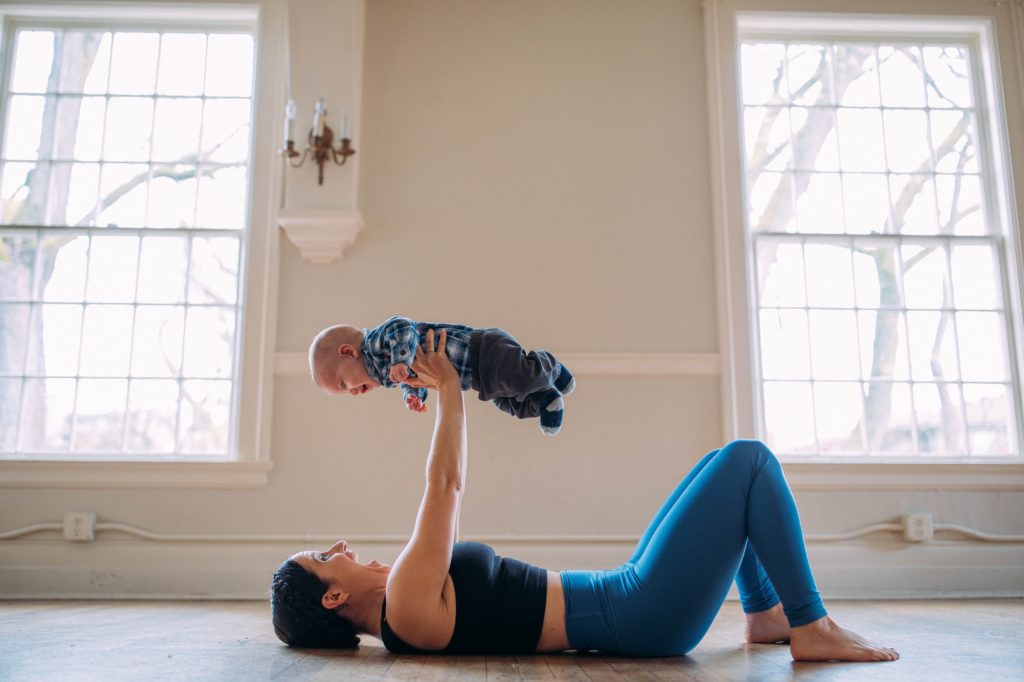
MACKENZIE: I pretty much despise the phrase get your body back.
MEGAN: Yeah me too it’s just awful.
MACKENZIE: I think it’s really—there are certain phrases and these ideas that society pushes on women, and the idea that you can “get your body back” after growing a human and birthing a human is—ridiculous.
Your body will never be the same. Like you just can’t get it back. You can manifest a similar shape—and skillset—but there’s always going to be differences. And so that’s a phrase I avoid using.
And I loved being pregnant. And I—basically if I could be pregnant all the time, I think I would. It really changed my relationship with my body—and I’ve always had a pretty good relationship with my body. There’s—I mean I’m human so there’s things that sometimes I wish would change more than others—but in general I’m super grateful. Like I’ve got a healthy functioning body that is mostly pain free most of the time, so that in and of itself is really all that matters to me.
But pregnancy really gave me a newfound respect for my stomach and that’s an area I think most women don’t like. I mean I guess I can’t speak for all women but it’s an area that is spoken about a lot and it’s like “suck your stomach in” and all these kind of like “have a flat stomach.”
MEGAN: As a yoga teacher, I’m sure you can speak for a lot of women who come in and demand core…
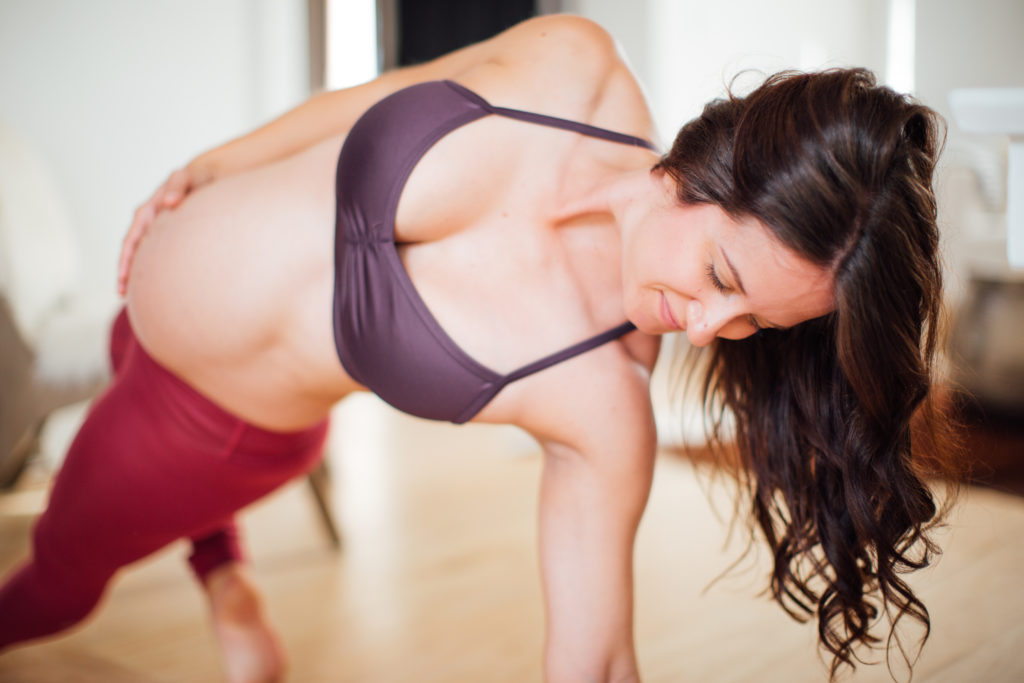
MACKENZIE: Yeah for me I think it was such an empowering experience to let my core go, in a sense. And the reality is—I didn’t. Like, physically I didn’t know how to turn my abs off in my first pregnancy.
I—because I’ve been a yoga instructor, and before that a personal trainer and group exercise instructor—I’ve been in the fitness industry for almost twenty years—and so I’ve basically been doing core work and keeping my abs tight to look as fit as possible in front of my clients, in front of my students, on camera, on Instagram, everywhere. It’s like—look as fit as possible—and so my abdominal muscles were—they just didn’t know how to turn off, which isn’t healthy for any muscle. All your muscles should be able to turn on and off when needed.
And so I had diastasis recti with my pregnancy with Adler and worked with a physio through that and then this pregnancy I found my abs much more—they’re just much more supple—like, physically [laughs] they’re not as toned as they were when I was pregnant with Adler, but I just—I know how to turn them off. I’m not sucking in all the time throughout my day, and for me it’s really empowering.
The other act that while pregnant I found really empowering—and I’m trying to continue it postpartum because I think it’s kind of a lesson I need to translate outside of being pregnant—but when I’m pregnant I treat my body so, so well. [Laughs.]
You know I eat—like in general—I eat healthy. I’m married to a vegetable farmer, my brother in law is a grazier, so he raises beef and we—I know where 90% of my food comes from.
MEGAN: That’s amazing…
MACKENZIE: I see it grow. I see it graze. So I’m really fortunate. The food I put in my body is really healthy. I also like chips.
MEGAN: That’s allowed.
We just aren’t very kind, the thoughts we think about our stomach. And so I’m trying to really consciously shift that postpartum here and continue to send love to my center, because I really believe our stomach is where it all kind of begins—at least for me in my experience that’s where most of my emotions reside.
MACKENZIE: But when I’m pregnant, I’m doing all the right things. I’m taking my vitamins, I’m staying quite active, I’m eating well, but one thing I’m really good at is rubbing oil all over my body when I’m pregnant. It’s like I just want to give my skin all this—and it’s partially vain because I want to avoid as many stretch marks as I can if that’s possible—and so I lube myself up every night before I go to bed and there’s something really therapeutic I’ve found about massaging my stomach. And specifically when there’s a little human in there it just seems like an act of love.
I’m just trying to… create these loving practices just for me instead of using the excuse of “I’m doing it for the baby.” I’m trying to do these loving practices for myself.
And now that I’m abruptly not pregnant, I’ve decided to continue it because I feel like our abdomen—our gut—is so undervalued, and in general we don’t treat it well. And we don’t often—society, I feel like, in general—it’s like you don’t listen to your gut—we, a lot of people numb through food. We just aren’t very kind, the thoughts we think about our stomach. And so I’m trying to really consciously shift that postpartum here and continue to send love to my center, because I really, I believe our stomach is where it all kind of begins—at least for me in my experience that’s where most of my emotions reside. If I’m upset, my stomach gets upset. And so yeah I’m just trying to shift that and create these loving practices just for me instead of using the excuse of “I’m doing it for the baby.” I’m trying to do these loving practices for myself.
MEGAN: Yeah, that’s so key. And I know it’s almost cliche how often it’s talked about these days—like, “self care,” taking care of yourself—and, you know, you’ve gotta take care of yourself so you can take care of your humans. But it’s still so overlooked even though it’s this huge thing in the media these days. So props for actually doing it. [Laughter.]
You mentioned your husband’s a vegetable farmer, so I’m so curious. You’re mostly doing motherhood these days it sounds like. So how are you and your husband making things work? Like how do you structure your lives so that you get to be the mom you want to be and he gets to be the dad he wants to be?
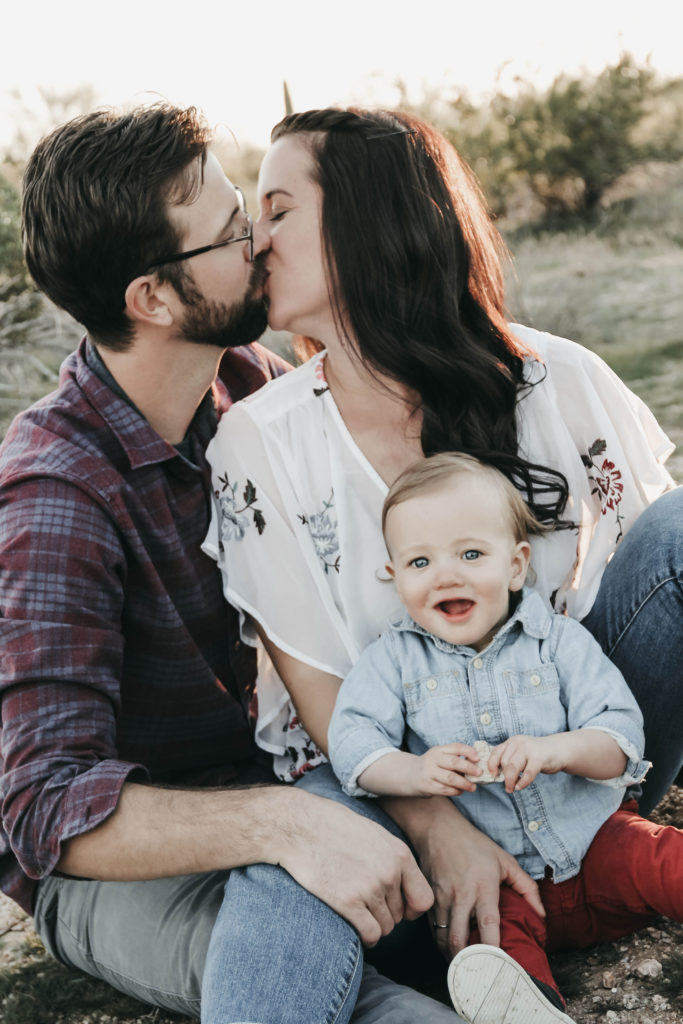
MACKENZIE: Yeah, our lives—we live kind of a unique life. At this time of year, in the winter, up in beautiful Red Deer, Alberta, it’s really fricken cold, and the grounds are covered with snow, and they’re frozen. And so in the winter, essentially Adler has two stay-at-home parents, which we’re really fortunate that that’s our circumstances, because—
Last year Adler was born at the end of October. We were home from Germany by the end of November and he was out of the NICU at the end of November—or, yeah, end of November—and so last winter we had a newborn baby and we were all just cozy at home together getting so much time to bond. And then this winter it is similar. Basically since the end of October, Mike has been home with me, and we’re kind of two stay at home parents.
In the summer it’s chaos. I’m essentially a single mom, because he’s gone all the time. [Laughs.] Although he really prioritizes the family. Really it’s a big value for both of us, and we value time together. So we’ve organized our life so that we can optimize as much time together as a family as possible.
And so we do get time together in the summer. We go out—Adler and I go out to the farm and—we go, he runs a CSA program, which is “Community Supported Agriculture.” I feel like in the States, really popular is the idea of, like, a food box program, and that’s what he runs. So we often help with that—delivering—well he doesn’t deliver, he does pickups, so we go to the pickups, and Adler helps everyone get their vegetables. [Laughs.]
MEGAN: I’m sure he’s great at it.
MACKENZIE: Oh yeah I’m pretty sure he’s the reason everyone’s there. [Laughs.] And yeah so we kind of have a unique life. It’s surprising how fast the winter goes by when there are two stay at home parents and neither of us get much done professionally. [Laughs.] It’s sometimes mind blowing. So we have to find—we’ve gotten much better about prioritizing and scheduling time for ourselves. So, time to go to the gym, time to do some computer work, et cetera, so that’s kind of our key to maintaining some sort of balance.
My idea for the future has really had to shift because of Adler’s unique entrance into the world.
MEGAN: Yeah. And speaking of professional pursuits, what are your professional pursuits? What are you up to these days in terms of—that—what are your hopes and dreams for the future?
MACKENZIE: Well, my idea for the future has really had to shift because of Adler’s unique entrance into the world.
[Editor's Note: Adler was born several weeks early while MacKenzie and Mike were traveling in Germany for a yoga conference. It was a complicated ordeal involving bed rest, an emergency cesarean birth, NICU time in Germany, a complicated flight home, NICU time in Canada, and finally, a healthy thriving baby brought home to Red Deer.]
We—my travel insurance, which shouldn’t shock anyone—won’t cover me while I’m pregnant—outside of Canada—so, when we found out I was pregnant, I had to cancel all of my teaching—scheduled teaching gigs—they were all outside of Canada. So, essentially I thought I would be home until the end of June—I was due June 29th—so figured I’d be home this whole year, one, being pregnant, and then I wanted to spend the first, kind of, six months postpartum focusing on being a mom. And so I thought 2019 was a write-off professionally speaking.
I’m a bit tentative. I’m really having to figure out what the new norm is going to look like for me.
Now I suppose that could change. I’m a bit tentative. I’m really having to figure out what the new norm is going to look like for me, because I’m hesitant to book anything honestly, professionally speaking, because if I got pregnant I’d just have to cancel again. So I’m kind of in this state of limbo.
I have been mentally exploring the idea—I don’t know—it still feels a bit cheesy to me—but the idea of e-books and creating support for women during pregnancy and postpartum physically and, kind of, mentally and emotionally as well. So creating an e-book that would encompass all that you would need and/or want to know that would support you throughout your journey.
MEGAN: Well I support that. I think you should do it. [Laughs] Because, I think, so—I’ve watched you on Instagram throughout, you know, completely before motherhood, as you went through pregnancy with Adler, having Adler, and then through this second pregnancy, and it’s been so interesting from an outsider’s perspective to see the transition in—not just your practice—but the way that you approach it. And it’s been so impressive to me to watch how your—like, how almost your way of moving, and your ease with your body has shifted, and if there was a way for you to communicate to women how to help make that shift, that would be—just so powerful I think.
Within yoga, I find—one of the reasons I slowly I feel myself backing away from what modern yoga is, is that I find it to be quite privileged and judgemental.
MACKENZIE: Yeah, I really—like, I love yoga and I always will, but there’s something so special to me about the club of motherhood.
I mean I think there’s lots of ways you can be a mom—I believe—and it doesn’t mean you have to have gone through pregnancy and, like, genetically be connected to a human to be a mother. And I just want to support—I just want to support other moms. And, you know, I’ve had—I think—well statistically they’re not that unique experiences, but having had a premature birth as well as now a miscarriage gives me a bit of a unique insight into different aspects of the motherhood club. And within yoga, I find—one of the reasons I slowly I feel myself backing away from what modern yoga is, is that I find it to be quite privileged and judgemental. And I have a really hard time with that specifically when it comes to pregnancy and delivering babies.
I’ve received so many messages from women who have also had C-sections and have felt complete shame around one, what they feel is their body’s inability to do what it’s supposed to, and that—just their story didn’t go as planned. And I suppose I just—I have a slightly different opinion about when things “don’t go as planned.”
The idea that—another phrase that really kind of bothers me is that idea that a vaginal, unmedicated birth is a natural birth. And to me all births are natural. They come as they come and that’s how nature wants it. Not everyone can have that birth story and there’s a lot of shame—you know—when I had to have an, well we chose to have an emergency C-section with Adler to reduce his risk of being exposed to an infection that was getting worse and worse in my body—we chose an emergency C-section and I’ve received so many messages from women who have also had C-sections and have felt complete shame around one, what they feel is their body’s inability to do what it’s supposed to, and that—just their story didn’t go as planned. And I suppose I just—I have a slightly different opinion about when things “don’t go as planned.”
And in having to have a C-section, I think your body did do what it was supposed to do. It gave signs that something wasn’t right and that intervention was needed and that you made a decision that not only would keep your little human safe but yourself safe as well. And I think that’s really important that—it’s like motherhood is a sacrifice in itself. Just being a mom, there’s endless sacrifices that come—but to sacrifice yourself and your health and your wellbeing only makes the struggles worse. So for me, I was super, super, incredibly grateful that I was able to have a C-section, and that Adler was delivered to us safe and healthy.
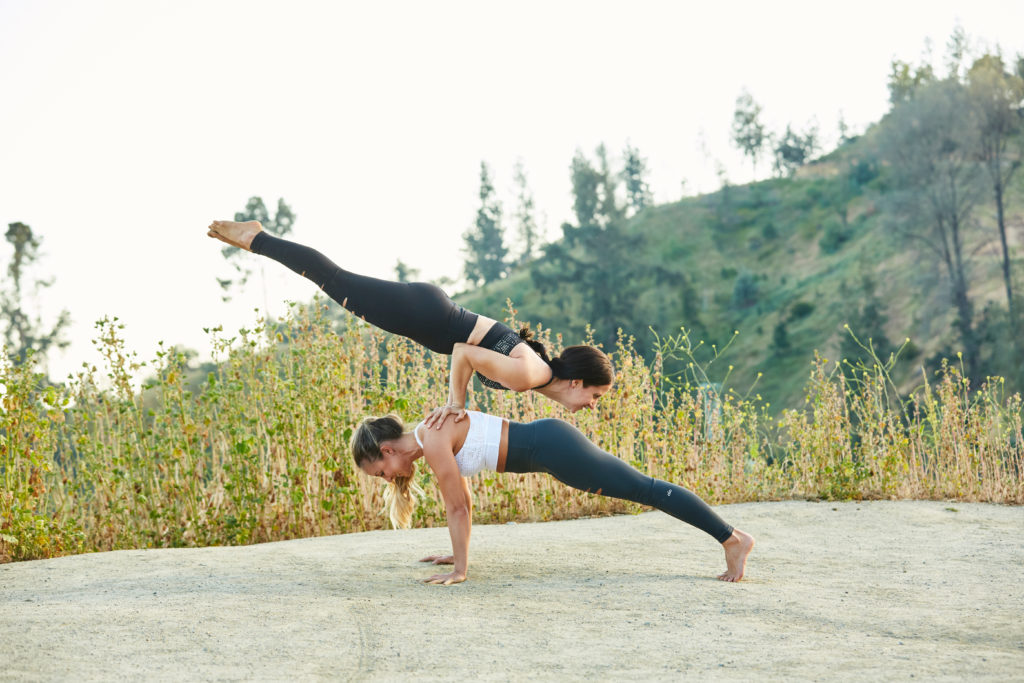
And so I just love, one, being supported by other moms, like having a close group of friends that are also mothers to help me navigate my journey into motherhood. Specifically I feel like your first child—you know, I don’t know what it’s like with the second and maybe you can give me some good insight with this-—but I feel like the first is like—excuse my language—it’s a complete clusterfuck.
MEGAN: [Laughs] That’s the only word that describes it.
You can “prepare” and read books and have rooms set up and babyproof everything but nothing prepares you. Nothing. So I feel like that first time having support and having a community is so, so crucial.
MACKENZIE: It really is. You can “prepare” and read books and have rooms set up and babyproof everything but nothing prepares you. [Laughs.] Nothing. So I feel like that first time having support and having a community is so, so crucial. Because there’s going to be challenging moments, like it’s a part of life, but to have people who are there to either hold your hand, to provide support in the form of meals—which I think is one of the best things you can do for any mom. Just drop meals off at her doorstep…
MEGAN: Like literally whenever postpartum, by the way, like two years postpartum it’s still welcome.
I just feel like it’s a complete privilege to hold space for moms online via Instagram in the way that I can and do.
MACKENZIE: It never ends. Seriously. Fifteen years from now I’ll still be accepting meals anytime someone wants to give them to me. So having support I think is just so important for moms and we live in this society—we used to have a lot of support from our families, and now often even if our families are near we don’t have the same amount and type of support that there used to be accessible to mothers, so it just can be such an isolating experience to be a mom. And I just feel like it’s a complete privilege to hold space for moms online via Instagram in the way that I can and do.
MEGAN: Yeah, absolutely. So I have to share something that’s on topic but off topic that I recently learned about cesarean birth, which is that—I don’t know if you’ve heard this but apparently in East Africa—in Uganda and the Congo cesarean birth—which was not called cesarean birth by them obviously—has been going on for millennia. Like, thousands of years. And it’s something that midwives, women, have been performing without issue going back thousands of years. And so I just it struck a chord when you said that this is absolutely one way to have a natural birth, because your body tells you, “Listen, this is not going to happen out that way. It needs to come out a different way.” And there’s a way to deal with that, and it’s not really modern science—it’s actually really ancient science. So that just—yeah, I had to share that.
[Editor's Note: Just as a postscript, I considered taking out the bit where I talk to MacKenzie about belly birth in East Africa, because after some extensive googling the best primary source I could find for this was one from 1879, which isn’t so old after all. As someone who studied history and historiography, this bothers me. But, after talking to my friend from Uganda, I learned that it’s common knowledge that belly births pre-date colonialism… it’s just not clear where it did come from. Suffice to say, women have been giving birth since the beginning of women, so it’s likely that there have been ways to solve for complications during birth long before cesarean birth became as common as it now is in the west.]
But then you also said something that just made me—I wanna know about your “woo-woo.” You were talking about how modern yoga doesn’t jive with you too much. It feels too privileged and it doesn’t work for you right now and something that’s really interesting to me is this “modern woo-woo” movement. What are the things about—I hate the word woo-woo, but I feel like it’s the only word that actually encompasses what I’m talking about. [Laughs]
MACKENZIE: Well I don’t actually know what you’re talking about, so… [laughs]
MEGAN: Oh you don’t?
MACKENZIE: No I don’t.
MEGAN: Well I’ll have to be more clear then. There’s sort of all these alternative ways of thinking, right? So I guess, what I’m interested in hearing from you is, what are some of the “hippie” things that you believe about yourself, about yoga if you want to talk about that, about birth, about motherhood that have—that you’ve really embraced lately?
And I think just the way that you were talking about yoga made me think about that, and how you’re really there to hold space not so much to do backbends.
I really like science and believe in it, but I also believe in more holistic practices like acupuncture and Chinese medicine—these practices that have been around for a really, really long time.
MACKENZIE: Yeah. Hmm. [Laughs.] I feel like I am—like, the way my mind works is quite fact-based. Which, I think, I mean, who can say what are facts anymore. [Laughs.] I feel like we live in this time and space where no one really trusts anything anymore, like you either believe in science or you believe in the more—the more—“hippie” “woo-woo” [laughs] forms of being, and I kind of lie in the middle.
I really like science and believe in it, but I also believe in more holistic practices like acupuncture and Chinese medicine—these practices that have been around for a really, really long time. I believe there’s a lot of healing that can be done using, kind of, herbs and oils. So one of the things that I definitely have embraced a little bit more of—the idea of using—essential oils, and you know—if you’re pregnant, definitely look into what essential oils—there’s some that are quite contraindicated during pregnancy so make sure that you look into that and always always always refer to your doctor, your midwife—whoever you’re using to guide you through pregnancy to choose the right path for you.
I feel like I’m kind of right in the middle. I like to know scientifically maybe what’s kind of going on with my body, and then I also like to research what are some more holistic ways we can that approach them.
I’m reading an interesting book right now. It’s called Not Broken, and it’s about miscarriage and recurring pregnancy loss. And it’s written by a doctor. And she works with women through infertility and miscarriage and recurring pregnancy loss. So she provides quite a bit of science behind different tests you can have done and, kind of, all the western medicine that there is to offer about these subjects. But then I’ve really found it interesting that there’s a whole section about eastern practices, and she has an acupuncturist and a TCM [Traditional Chinese Medicine] doctor, kind of, write a bit of this chapter for her.
It’s like folic acid is really good—or folate specifically—is really good before you get pregnant because it helps reduce spine issues in early development in the fetus. And it’s like—we know this. It’s proven by science. But the best way to get that, instead of prenatals, is eating foods— ingesting foods—that are high in that.
But there’s so much about the practices of yoga, including meditation and pranayama—breathing techniques—that as much as—something that I was really conscious of when I got pregnant with Adler was not only what I was putting into my body—you know we often think about health and it’s our physical health—it’s what I’m putting into my mind. So what am I consuming? Like, am I binging Netflix all the time? What types of shows am I binging? What am I reading? What—how much am I scrolling? How much am I letting all this content around me into my mind, and then also am I doing mental healthcare? So am I doing my meditation practices? Am I just even doing mindfulness techniques if meditation feels a little bit—sometimes I find people are quite intimidated by meditation, sometimes mindfulness is an easier gateway into what meditation can offer you. And so I think that there is so much, kind of, tangible stuff—like science and these studies and what we know.
It’s like folic acid is really good—or folate specifically—is really good before you get pregnant because it helps reduce spine issues in early development in the fetus. And it’s like—we know this. It’s proven by science. But the best way to get that, instead of prenatals, is eating foods— ingesting foods—that are high in that. So I feel like there are so many ways that we—thankfully, because of modern science we know certain things about pregnancy—but there’s a lot of solutions that are more natural. And so if there are more natural solutions, I try to do those [laughs] if possible.
I’m kind of right in the middle I think.
MEGAN: Yeah. But I think that’s kind of the informed sweet spot. Because you get to use what you can learn from both to find what works for you.
I think what’s most important with any decision ever in life is what decision can you live with and provides you the least amount of stress in making it.
MACKENZIE: Yeah, I don’t know. I think what’s most important with any decision ever in life is what decision can you live with and provides you the least amount of stress in making it.
And so, like, I feel like there’s lots of good examples of this. And just using labor and delivery as an example—I have a best friend who’s a NICU nurse and she has two beautiful daughters and with both of them there’s no way ever in her lifetime she would work with a midwife. And it’s because her reality is seeing these sick little babies and seeing the worst case scenario of labor and delivery. So for her, the least stressful decision would be to be in the hospital. The hospital is a place that she feels safe and feels comfortable and so for her that’s the right decision. For me [laughs], I don’t like hospitals and if I can avoid being in a hospital as much as possible, you know, without putting myself at risk, that’s the route I am going to choose. And so for me, working with a midwife and the idea of a home birth is more comforting mentally.
It’s not that either is right or wrong but there’s, I think, a right or wrong for you. And so you just have to find what that is. What you can live with. What feels [laughs] peaceful in your heart and just rock it.
MEGAN: Yeah absolutely. When I—we had a hospital birth for our first and a home birth for our second and when we were interviewing midwives for the home birth—my husband was super skeptical, and he was really not on board with the whole home birth thing—and so they were talking about—he was asking a lot of questions about risk factors and what we should be worried about. And she had—she knew all of them. We live in San Francisco, so we’re literally ten minutes from the best hospital in the state if something were to happen, but she explained it like, there are risks in a home birth and there are risks in a hospital birth and you just have to decide which ones you personally are more comfortable taking on. And I thought that was such a perfect summation of how it is. You know—risks but also just how you feel and choosing based on that.
I know we’re kind of coming to the end here and I just want to ask a couple of—I have like a couple of quick questions. They’re fast questions—you don’t have to answer them quickly—though maybe you can. The first one would be…
What baby gear or books or gadgets or products do you totally swear by and whenever a mama friend is pregnant you’re like, you have to have this?
I swear by sleep training. And it’s a shock to me that that’s the truth, because when I first became a new mom—it’s like, how could I ever let my baby cry at all? But sleep training I think saved my sanity.
MACKENZIE: Oh wow. Well—and I’ve been quite vocal I think about it on my Instagram… I swear by sleep training. And I [laughs]—it’s a shock to me that that’s the truth, because when I first became a new mom [laughs]—it’s like, how could I ever let my baby cry at all? But sleep training I think saved my sanity. Adler did not sleep through the night. He wasn’t a natural sleeper I’d say [laughs]. Like, he—if there was an opportunity to be on my boob and he knew he could, by crying when he wakes up, like, he’s all about it.
He’s one of—I don’t know—I think there’s some kids that are quick to catch on that they can manipulate the system [laughs], and he’s one of them. He’s like, “oh sweet. I wake up. I cry. I get the boob.” So sleep training. I did a program with a fantastic woman. Her name is Cara, and her Instagram is @takingcarababies. She is a nurse and her husband is a doctor and so they have—there’s a lot of science behind their technique and what her beliefs are. But oh man it saved my life. I went from, you know, sleeping [laughs] two hour stretches at a time, to—by the third night—Adler sleeping through the night, So for me, that was a sanity saver. So, like, I just believe in creating healthy sleep habits.
MEGAN: When did you sleep train, if you don’t mind me asking?
MACKENZIE: We started at six months with Adler, but that was his non-adjusted age. He would’ve been—I think he was four and a half months adjusted, since he was premature. And she doesn’t really recommend you start training until after the four month sleep regression. I didn’t, like I said, I wasn’t really about sleep training before I reached my breaking point [laughs], mentally, but she has programs for newborns and the four month sleep regression to help start creating healthy sleep associations until you get through that four month sleep regression, and then she believes that mentally they’re able to better understand and soothe themselves is the main skill that happens at that development point. So, yeah. I’m all about it.
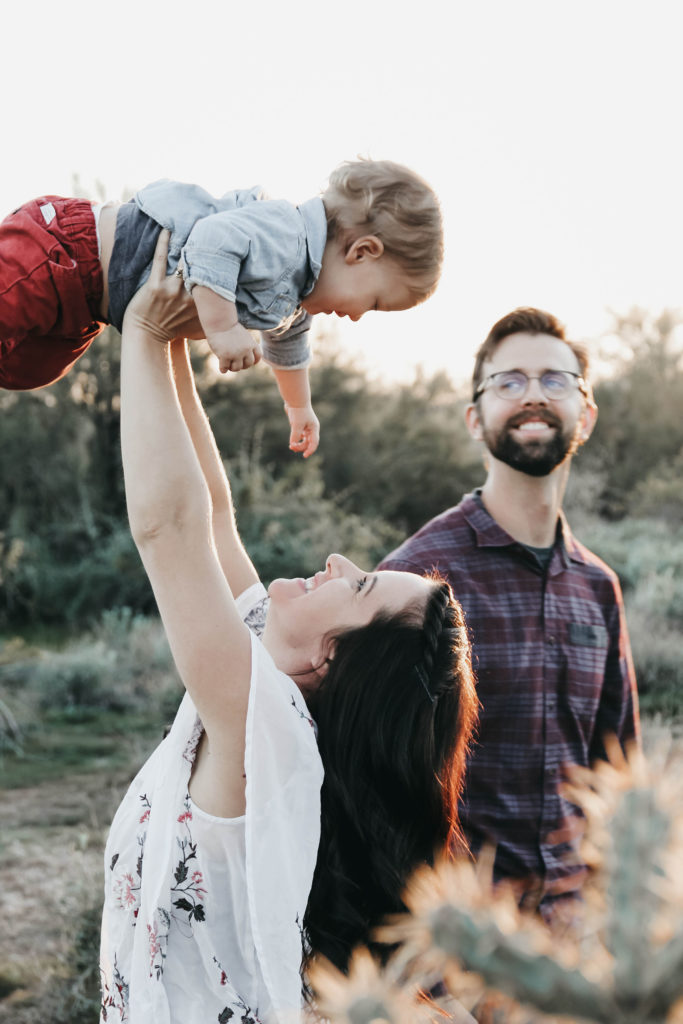
MEGAN: You’re all about it. That’s what’s on tap for Friday. That’s my fun Friday evening activity. [laughs] It’s like the worst, but the best.
MACKENZIE: I know. It’s a little heart breaking. But I had a friend—and this isn’t maybe 100% the right analogy—but it helped soothe my mind when I was feeling kind of like a little bit of mom guilt for letting my baby cry a little bit—and she was like, if your kid was crying because he wanted ice cream for breakfast you wouldn’t give in to them. And your baby is just trying to learn their boundaries, and you’re teaching them good self soothing habits. And so I felt a little bit better. [Laughs.]
MEGAN: I like it. [Laughs.] Anything that helps, right?
MACKENZIE: Yeah. Noise canceling headphones also help.
I also love my Ergo. Like, I wore Adler everywhere. For a long time it was kind of a nice way to be able to get outside and just wear him. He’d often sleep in his Ergo and it was one way I could kind of get exercise when he was on the younger side. Like I probably didn’t—it’s so cold here—that I wouldn’t have wanted to get outside until he was five or six months, but once it was, I’d just strap him in and walk. And we have, like a set, we’ve got a little, kind of like forest area by our house that has a good walking trail and some stairs and I’d go and just walk up and down the stairs with him. So it was a way I could, kind of, get a little bit of exercise in without having to have someone come and watch him. I didn't really leave him too much [laughs] when he was young—really young.
MEGAN: And then, favorite thing to do if you have a little bit of extra time for yourself?
MACKENZIE: Oh, I—I mean, I’ll always choose to go to the gym.
MEGAN: And work out or, like, what do you do at the gym?
MACKENZIE: I mean it kind of—it changes [laughs]—what I do. I mean the real answer—so like, my in-laws watch Adler every Tuesday, and so generally Tuesdays are my self care day where I’ll go to the gym. And right now, since essentially—I’m kind of postpartum, I walk very, very slowly on the treadmill. [laughs] That’s basically all I do. I’ll eventually add in a little strength training, but for me walking on the treadmill—and I generally will, like, watch a show—is really mentally therapeutic. It’s like, no one's asking anything of me. I just get to enjoy something. Kind of mentally check out and do something good for my body. So that feels really nice. But I also love massages, facials, really any kind of delicious treatment to my body.
MEGAN: [Laughs.] That’s the best adjective.
MACKENZIE: Where I just get to lie there. I’m all in.
[Laughter.]
It’s easy to double a recipe and give a meal to a mom. That’s—to me it’s an easy act that means a lot. And so I think it’s less about what a new mom should be doing and what current moms could be doing to support other women as they journey into motherhood.
MEGAN: I think every mom can relate to that. And then just the last one: What would your number one recommendation be for moms-to-be either about pregnancy, the postpartum experience, motherhood—or, like, what’s something that you tell others because you wish that you’d known it yourself?
MACKENZIE: Oh I mean I’ve already kind of said it but I think—create a community around you of mothers. And I guess like, mine would be less for maybe women who are about to become moms and more for women who are already moms. It’s like, it’s easy to double a recipe and give a meal to a mom. That’s—to me it’s an easy act that means a lot. And so I think it’s less about what a new mom should be doing and what current moms could be doing to support other women as they journey into motherhood.
MEGAN: I love that. I love that.

